
I got my first negative comment today, on the What Would Jefferson Do? Does it Matter? posting. The commenter's handle, "pinetreeheaven7," is not a valid screen name, so I will respond here. Please be aware, though, that I really, really don't like to argue about religion or politics, or much of anything, to be honest. So this is a one time deal. If at the end of this entry you think, as pinetreeheaven7 does, that I'm somehow not "really" a Christian, you're mistaken, but I'm not going to spend my life trying to convince you about this. Any further attacks on this church-attending, Bible-reading, Kerry-supporting Democrat will be deleted without comment. You are, however, free to express your views elsewhere, as long as it's not for the purpose of slandering me. Onward.
My unsendable email reply (slightly edited) begins:
I really don't like confrontation, so I'm only going to do this once. You took your shot at me, and now it's my turn. After that there will be no more turns, not between you and me, anyway.
In a message dated 7/31/2004 10:45:27 AM US Mountain Standard Time, AOLAlerts writes:
If you are a Christian I will eat my hat. Episco what?
The Episcopal Church has been around for centuries, and was one of the first to diverge from the Catholic Church. Like everything else in this world, it's not perfect, but it is certainly Christian. St. Michael's in particular is a wonderful place. It's arrogant and ignorant in the extreme of you to assume that Episcopalians are not really Christians, or that I am not. I not only attend church every week, but I usually serve at Mass as crucifer, torch or lector, especially in the summer when we're shorthanded. It has always horrified me that some Christians will narrow the definition so that it means "everyone who agrees with me" rather than "everyone who does his or her best to follow Jesus." Once people put someone else in the box labeled "Them" instead of "Us," they tend to feel justified in treating that person as subhuman, which is the very antithesis of the teachings of Jesus.
Christians are against murder (killing babies).
I am very much against killing babies. I am also against killing adults and children. Somehow, some of the same Christians who think that birth control is a mortal sin have no problem with killing Iraqis, prisoners, or even doctors who disagree with them. "Thou shalt not kill" is not an easy commandment to live up to, even if it's recast as "You shall not murder." I, personally, have never killed anyone.
They beleive that marriage is Sacred and Holy insitution between a man and a woman, ordained by God as a symbol of our faithfulness and committment to Him.
For a gay couple to emulate that in the eyes of state law (which is separate from God's law, although it follows most of the same principles) does not make this any less true.
Ten commandments has these two listed as top commandments. Lies and slander are also something that God condemns.
First of all, depending on your numbering (which varies in different sects according to where the text gets broken up, but still adds up to 10), the top two commandments are about one's duties to God (not having strange gods before Him, etc.). The ones against murder and slander come later in the list. All of the commandments are subsets of the main two: "You shall love the Lord your God with your whole heart, your whole mind, and your whole strength," and "You shall love your neighbor as yourself." The commandments you refer to are part of that second one.
As for lies, all my life I have tried very hard never to lie to anyone about anything. I manage it about 99.9% of the time. That doesn't mean that people always agree with me. I have never lied or slandered anyone in my journal. (I have written fiction, though.)
If you are truly for religious freedom then i suggest that you join the groups that are fighting the ACLU. This organization's main goal is to get anything that points to the bible or Christ out of everything.
Many Christians, including myself, disagree with you. Your claim about the ACLU *is* slander. The ACLU believes that people have a right to believe as they choose, or not to believe at all. Religious freedom is exactly that. What you want is the "right" for everyone to be forced to agree with you. Nobody is preventing you from believing what you believe. They are merely defending the right of other people to believe something else. (In retrospect, I suppose that the commenter means "out of everything in the government." The concept of separation of church and state was important to Jefferson and other Founding Fathers, and remains important today. If a courthouse can't post the Ten Commandments, or if "under God" is eventually removed from the Pledge of Allegiance, that in no way "prohibits the free exercise" of religion. It merely keeps a governmental institution from openly endorsing a particular form of religious faith.)
Hollywood is the only ones that have true freedom of speech now and they are great supporters of the ACLU.
Shall I correct your grammar? You go from singular to plural in the same clause. The correct construction would be "People in the Hollywood entertainment industry are the only ones now who have true freedom of speech. They are great supporters of the ACLU." Even with corrected grammar, the first part is a false statement. You demonstrated your right to free speech by posting on my journal. I will allow the comment to stand--once. I will block future postings by you on my journal, as is my right as editor/publisher of this particular forum. You are still free to post your misguided nonsense elsewhere--for example, in your own journal. (Of course, that would require having a real account somewhere.)
Larry Flint is also on their membership list.
He's a jerk, (IMO) but so what? It doesn't mean that he's wrong 100% of the time. People are complex, and one of the complexities is that nobody (except Jesus) is completely right or completely wrong in every way.
How about "What would Jesus do?"
Which, of course, I acknowledge indirectly in the piece you commented on. In the current instance, I think Jesus would want me to treat you with compassion, but speak out against your errors.
You can find this out by reading your bible. Take the time and you will never regret it.
If you had read my whole journal (which admittedly is a lot of reading), you would see that for Lent I reread the four Gospels and part of Acts. I have been to classes about some of Paul's epistles. I've read much of the Old Testament (but not all of it), including bits that most people would prefer to skip over, because otherwise Christians would still be offering burnt sacrifices and keeping Kosher (to name two of the less over-the-top practices that don't involve actually killing people). I read aloud from the Old Testament in church. And what's more, I think I understand some of it, a little. I'm not perfect, but I don't hate anyone. I do my best to love my enemies. Can you say the same?
Regards and with prayers that you will someday understand your own faith better,
Karen Funk Blocher
 Someone called SmartyPantzJessi sent me this neat cactus picture for this journal. I messed with it a little - I hope you don't mind! I especially like the Disney-style lettering.
Someone called SmartyPantzJessi sent me this neat cactus picture for this journal. I messed with it a little - I hope you don't mind! I especially like the Disney-style lettering.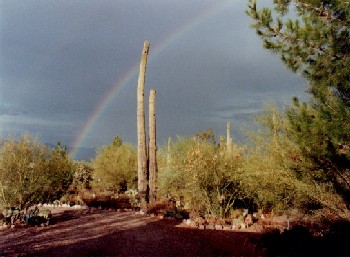 The other picture is a rerun from an older posting. It was taken at our old house on Grannen Road over a decade ago. Another picture from that same property, featuring a more typical saguaro with multiple arms, can be found several entries below this one.
The other picture is a rerun from an older posting. It was taken at our old house on Grannen Road over a decade ago. Another picture from that same property, featuring a more typical saguaro with multiple arms, can be found several entries below this one.
 So what's wrong with nuance?
So what's wrong with nuance?
 Weekend Assignment #17: Through some unexplained miracle, your pet or pets gain the mental capacity for speech for exactly the length of a single sentence. What do you think that sentence would be and why?
Weekend Assignment #17: Through some unexplained miracle, your pet or pets gain the mental capacity for speech for exactly the length of a single sentence. What do you think that sentence would be and why?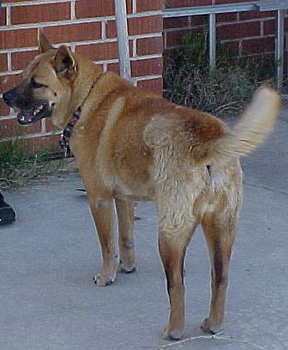


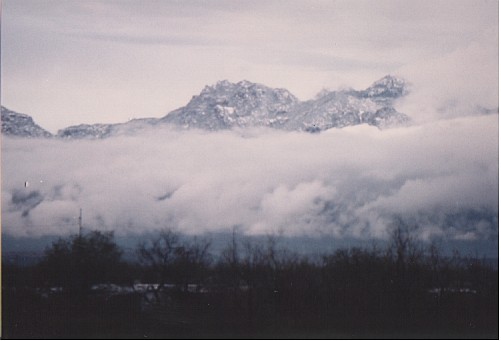 Happy
Anniversary, AOL J-Land! As part of the festivities, I now
present a time-traveling, virtual tour of Tucson, Arizona, spring 1986.
Happy
Anniversary, AOL J-Land! As part of the festivities, I now
present a time-traveling, virtual tour of Tucson, Arizona, spring 1986.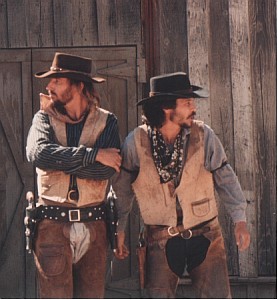 Boy,
the mountains were pretty, though, when John took pictures that
afternoon. The cloud hung below the top of the Catalinas (above).
We thought that was about the best "dramatic weather" (as John called
it) we'd ever seen.
Boy,
the mountains were pretty, though, when John took pictures that
afternoon. The cloud hung below the top of the Catalinas (above).
We thought that was about the best "dramatic weather" (as John called
it) we'd ever seen.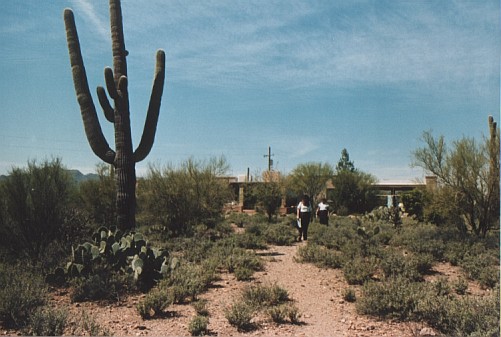
 I heard Arizona Governer Janet Napolitano say yesterday that Arizona's
population (if I recall correctly) has gone up 40% per decade. An
amusing, mostly-true book called Arizona 101 says that most
people in Arizona would like the borders to have been closed right
after they arrived, just to preserve what's uniquely Arizona from
overdevelopment. Well, there's still lots of desert in Arizona,
but it's very true that things have changed since we got here in
1986. Hardly anyone wears a cowboy hat any more, except during
Rodeo Days, which are still a school holiday in March. Valley National
Bank is now Bank One, Ev Meacham is long gone from the governorship,
thank goodness, and Indian jewelry stores and IBM have given way to
call centers and companies built around optics or defense
contracting. It's still a pretty neat place, though. And you are
(virtually) there!
I heard Arizona Governer Janet Napolitano say yesterday that Arizona's
population (if I recall correctly) has gone up 40% per decade. An
amusing, mostly-true book called Arizona 101 says that most
people in Arizona would like the borders to have been closed right
after they arrived, just to preserve what's uniquely Arizona from
overdevelopment. Well, there's still lots of desert in Arizona,
but it's very true that things have changed since we got here in
1986. Hardly anyone wears a cowboy hat any more, except during
Rodeo Days, which are still a school holiday in March. Valley National
Bank is now Bank One, Ev Meacham is long gone from the governorship,
thank goodness, and Indian jewelry stores and IBM have given way to
call centers and companies built around optics or defense
contracting. It's still a pretty neat place, though. And you are
(virtually) there!

 P.S. Thanks, everyone, for stopping by.
P.S. Thanks, everyone, for stopping by.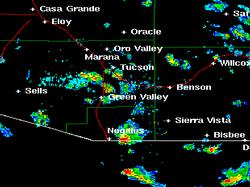 This is more like it. We've had significant rain most of the afternoon here in midtown Tucson, real monsoon activity instead of just rain over the mountains. At least one major city street was briefly closed due to flooding. With any luck, I'll find water actually flowing in a wash once I get off work, and get you a couple of pictures.
This is more like it. We've had significant rain most of the afternoon here in midtown Tucson, real monsoon activity instead of just rain over the mountains. At least one major city street was briefly closed due to flooding. With any luck, I'll find water actually flowing in a wash once I get off work, and get you a couple of pictures.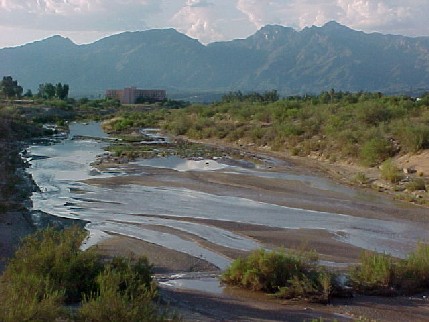 Later:
Later:  I was the first caller again today on NPR's Talk of the Nation, and I think it was one of my better efforts. I have no doubt that if I dare to
I was the first caller again today on NPR's Talk of the Nation, and I think it was one of my better efforts. I have no doubt that if I dare to  * Oklahoma! We talked an antique shop owner into selling us a genuine U.S. 66 sign as part of a half-hour conversation. We talked about the bypassing of small town America vs. the continuing interest in Route 66 and local color by writers and certain types of travelers. It turned out there were at least two other writers working on Route 66 books that year. I hope they did better with their books than I did with mine, which is still sitting on C-64 floppies in a word processing program called Paper Clip. Does anybody out there have the capability of converting those files for me?
* Oklahoma! We talked an antique shop owner into selling us a genuine U.S. 66 sign as part of a half-hour conversation. We talked about the bypassing of small town America vs. the continuing interest in Route 66 and local color by writers and certain types of travelers. It turned out there were at least two other writers working on Route 66 books that year. I hope they did better with their books than I did with mine, which is still sitting on C-64 floppies in a word processing program called Paper Clip. Does anybody out there have the capability of converting those files for me?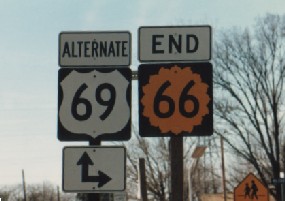 * Tucumcari Tonight! We loved Albuquerque, but Gallup and Tucumcari were even prettier and more Route 66-ish. We seriously considered moving to Gallup, until we saw Tucson a week or two later. The romance with New Mexico was somewhat tarnished, however, by the replacement of the van's starter in Tucumcari under slightly hinky circumstances.
* Tucumcari Tonight! We loved Albuquerque, but Gallup and Tucumcari were even prettier and more Route 66-ish. We seriously considered moving to Gallup, until we saw Tucson a week or two later. The romance with New Mexico was somewhat tarnished, however, by the replacement of the van's starter in Tucumcari under slightly hinky circumstances.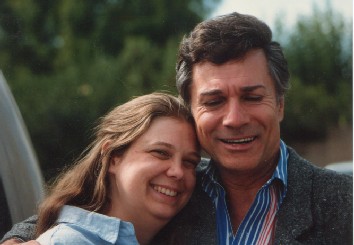 * Denny's, Las Vegas. We arranged our interview with Route 66 star George Maharis over the phone at a Denny's in Burbank. He was doing dinner theatre in Las Vegas at the time. When the local restaurant Maharis named for the interview venue turned out not to be open for breakfast, we ended up at a Denny's instead. Among other topics, he spoke at some length (as did Martin Milner in a separate interview) about how much the country had changed since the actors filmed their tv show entirely on location, in a different town every week. Back in 1960, a small town in New Mexico was very different culturally from a shrimping town on the Gulf, a dam project on the Colorado, or a logging camp in the Pacific Northwest. Even getting to such places could be an adventure. "Now you can go anywhere you want," Maharis concluded, "and it's a Denny's."
* Denny's, Las Vegas. We arranged our interview with Route 66 star George Maharis over the phone at a Denny's in Burbank. He was doing dinner theatre in Las Vegas at the time. When the local restaurant Maharis named for the interview venue turned out not to be open for breakfast, we ended up at a Denny's instead. Among other topics, he spoke at some length (as did Martin Milner in a separate interview) about how much the country had changed since the actors filmed their tv show entirely on location, in a different town every week. Back in 1960, a small town in New Mexico was very different culturally from a shrimping town on the Gulf, a dam project on the Colorado, or a logging camp in the Pacific Northwest. Even getting to such places could be an adventure. "Now you can go anywhere you want," Maharis concluded, "and it's a Denny's." Meet
Knowledge Queen., who has the ability to absorb large amounts of
information as easily as Rogue absorbs other people's super powers
(okay, with maybe a bit more work than that), and to disseminate the
resulting knowlege to anyone in range, whether they want it or not.
Meet
Knowledge Queen., who has the ability to absorb large amounts of
information as easily as Rogue absorbs other people's super powers
(okay, with maybe a bit more work than that), and to disseminate the
resulting knowlege to anyone in range, whether they want it or not. I
registered on the Fayetteville-Manlius alumni site, but I have no plans
to go to Manlius for my 30th high school reunion next year. Maybe if I
was a CPA by then and had a printed copy of Heirs of Mâvarin in
hand (from a major publisher, of course), I'd go. Maybe. Without
those things, I can't prove that my graduating class was wrong to deny
me the Most Likely to Succeed award at the F-Emmys, and to give me the
Gladys Ormphby Award instead. Even with the book and the CPA
designation, I'm not at all certain sure my old classmates would be
impressed. On the other hand, none of my classmates are U.S. Senators
or Nobel laureates or Grammy winners or CEOs in the Fortune 500.
Probably. So why should I feel defensive or intimidated?
I
registered on the Fayetteville-Manlius alumni site, but I have no plans
to go to Manlius for my 30th high school reunion next year. Maybe if I
was a CPA by then and had a printed copy of Heirs of Mâvarin in
hand (from a major publisher, of course), I'd go. Maybe. Without
those things, I can't prove that my graduating class was wrong to deny
me the Most Likely to Succeed award at the F-Emmys, and to give me the
Gladys Ormphby Award instead. Even with the book and the CPA
designation, I'm not at all certain sure my old classmates would be
impressed. On the other hand, none of my classmates are U.S. Senators
or Nobel laureates or Grammy winners or CEOs in the Fortune 500.
Probably. So why should I feel defensive or intimidated?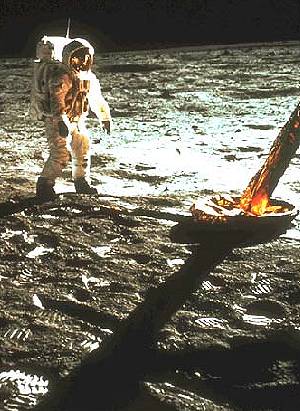 I was twelve years old when my family sat around a black and white tv and watched Neil Armstrong step onto gray alien dust. We were at a vacation home on Lake Ontario, the Speakman camp, the same place I mentioned in my vacations and food entry last week. In all the years we rented that place, that was the one moment that really connected us to the world. Lake Ontario connected us to Canada, but that tv broadcast touched the whole world.
I was twelve years old when my family sat around a black and white tv and watched Neil Armstrong step onto gray alien dust. We were at a vacation home on Lake Ontario, the Speakman camp, the same place I mentioned in my vacations and food entry last week. In all the years we rented that place, that was the one moment that really connected us to the world. Lake Ontario connected us to Canada, but that tv broadcast touched the whole world. Grainy images
Grainy images Because the Night
Because the Night As most of you know by now from my relentless cross-promotion, the word Mâvarin is the name of a fictional country in which my unpublished novels take place. I've been working on them off and on for longer than some of you have been alive: roughly 30 years.
As most of you know by now from my relentless cross-promotion, the word Mâvarin is the name of a fictional country in which my unpublished novels take place. I've been working on them off and on for longer than some of you have been alive: roughly 30 years.  This year, the arcane standards of the National Weather Service that determine when the Arizona monsoon starts proved to be less demanding than mine are. As of today, their page about the monsoon says that it started last Thursday, July 8th. I, on the other hand, was trying to hold out for actual rain in the city of Tucson itself, which is to say, any place I happened to be at the time. Not a few raindrops, but rain. A gullywasher. Or, more to the point, a car washer.
This year, the arcane standards of the National Weather Service that determine when the Arizona monsoon starts proved to be less demanding than mine are. As of today, their page about the monsoon says that it started last Thursday, July 8th. I, on the other hand, was trying to hold out for actual rain in the city of Tucson itself, which is to say, any place I happened to be at the time. Not a few raindrops, but rain. A gullywasher. Or, more to the point, a car washer.
 When
I started out to church this morning, there was hardly a cloud in the
sky. Now they're building up again over the mountains, mounds of white
puffy promise that make the Catalinas and the Rincons look small.
But overhead, the sky is perfectly blue and clear. I'll be very
surprised if it rains today.
When
I started out to church this morning, there was hardly a cloud in the
sky. Now they're building up again over the mountains, mounds of white
puffy promise that make the Catalinas and the Rincons look small.
But overhead, the sky is perfectly blue and clear. I'll be very
surprised if it rains today. Later that same day...
Later that same day...
 Let me qualify that: it probably rained on the edges of Tucson. There was lightning over the Tucson mountains and the lower end of the Catalinas near the Rincons. There were the vertical streaks on the horizon in two directions that could mean either virga (rain that doesn't reach the ground), or real rain. But in the city, nothing. Nothing but clouds.
Let me qualify that: it probably rained on the edges of Tucson. There was lightning over the Tucson mountains and the lower end of the Catalinas near the Rincons. There were the vertical streaks on the horizon in two directions that could mean either virga (rain that doesn't reach the ground), or real rain. But in the city, nothing. Nothing but clouds. Everyone in Tucson is waiting for the monsoon. It's the main topic of conversation. The guys at vehicle emissions, testing fumes in a 110 degree open concrete building, watch the sky and wait. People give each other updates at the bank, or when they get home from work. People get on the rooftops, patch them, and give them a fresh layer of white "cool cote," so there won't still be leaks in the ceiling when the rain starts. People look at their filthy cars, and try to decide whether it's worth going to the car wash, only to see the car get dirty again the next time it sprinkles, or else get cleaner in the first big storm.
Everyone in Tucson is waiting for the monsoon. It's the main topic of conversation. The guys at vehicle emissions, testing fumes in a 110 degree open concrete building, watch the sky and wait. People give each other updates at the bank, or when they get home from work. People get on the rooftops, patch them, and give them a fresh layer of white "cool cote," so there won't still be leaks in the ceiling when the rain starts. People look at their filthy cars, and try to decide whether it's worth going to the car wash, only to see the car get dirty again the next time it sprinkles, or else get cleaner in the first big storm. I took a bunch of pictures today from the edge of the Costco parking lot. Here are two of them. The green stuff is mesquite and greasewood and palo verde trees and sagebrush, all growing in the Rillito River. That's right; you're looking at a dry river bed. And yes, all that white stuff is trash. There were also a bunch (covey?) of Gambel's quail, but they wouldn't pose for the camera.
I took a bunch of pictures today from the edge of the Costco parking lot. Here are two of them. The green stuff is mesquite and greasewood and palo verde trees and sagebrush, all growing in the Rillito River. That's right; you're looking at a dry river bed. And yes, all that white stuff is trash. There were also a bunch (covey?) of Gambel's quail, but they wouldn't pose for the camera.



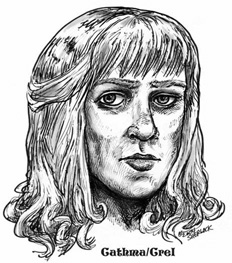

 I
don't have a picture of my friend Eva, so you'll have to settle for
pictures of my parents. The distinguished man on the left is Dr.
Frank E Funk, former Dean of University College, former Director of
Continuing Education at Syracuse University, former president of the
I
don't have a picture of my friend Eva, so you'll have to settle for
pictures of my parents. The distinguished man on the left is Dr.
Frank E Funk, former Dean of University College, former Director of
Continuing Education at Syracuse University, former president of the 
 You are looking at an archive edition of
You are looking at an archive edition of 


